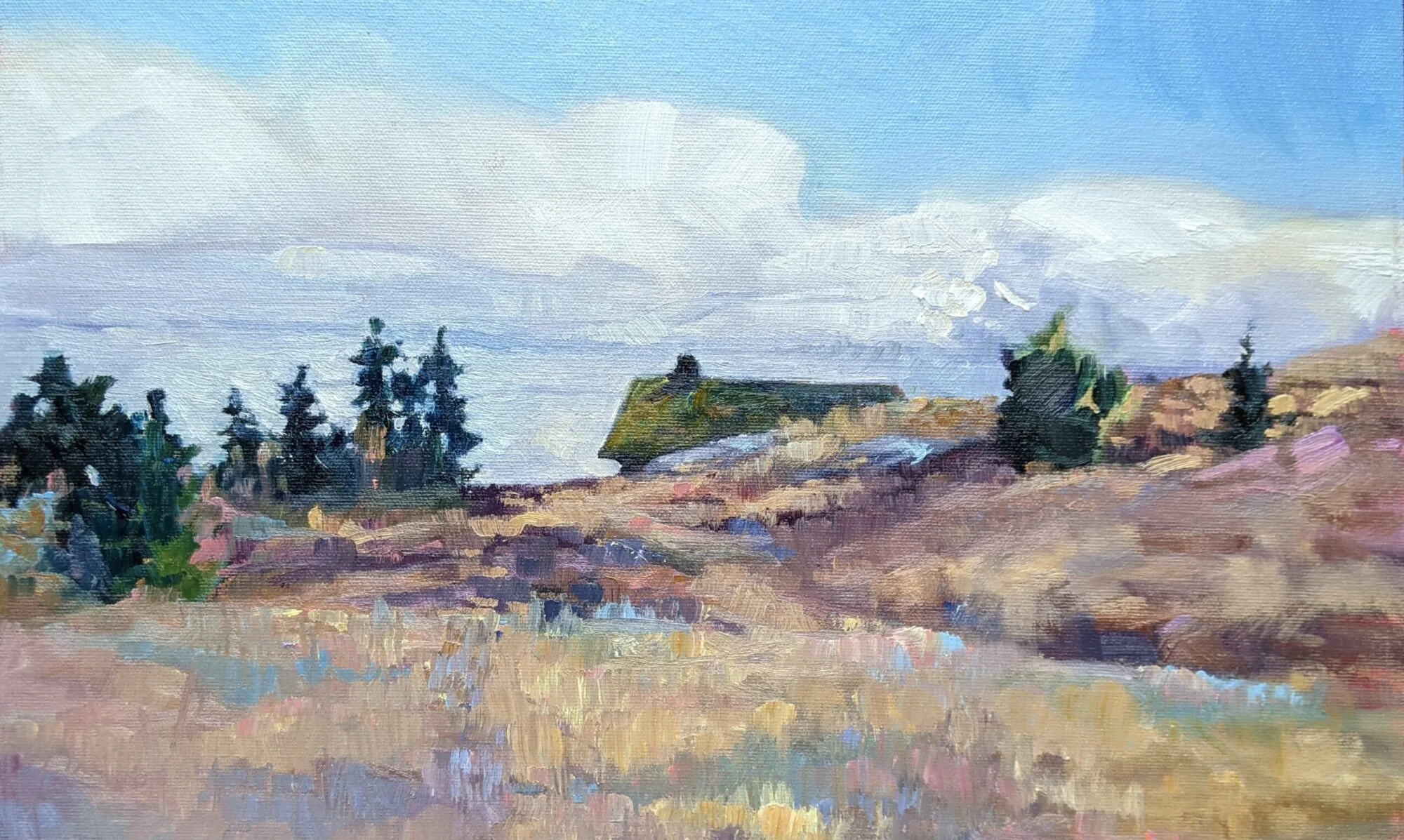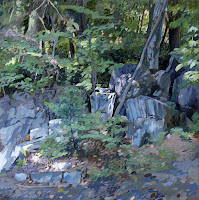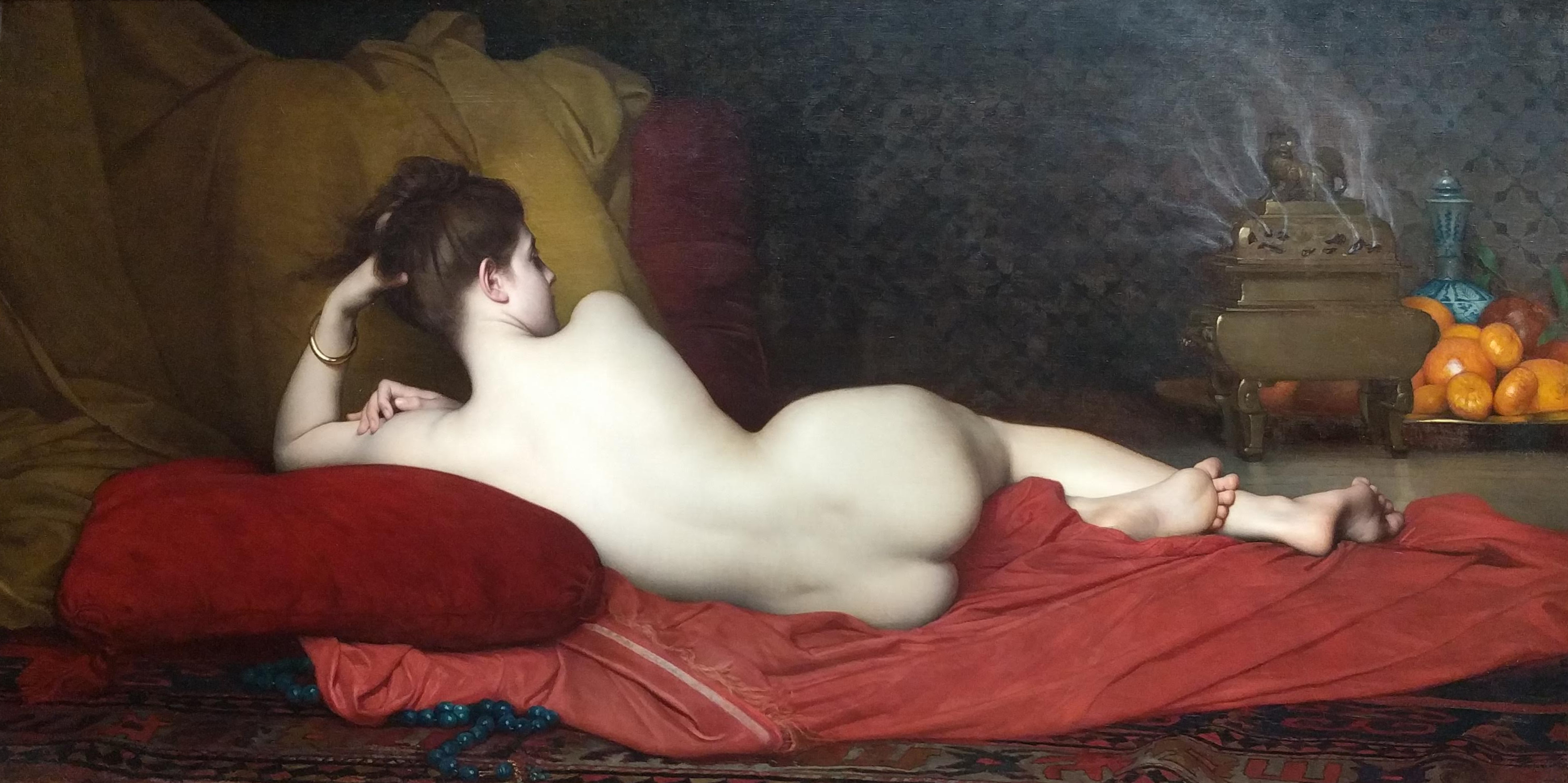 |
| Not our anonymous naturalist, alas, since I haven’t any pictures of her. A nude by little ol’ me. |
After dusk last night, a shifty-looking fellow rang my front bell and abruptly thrust a sheaf of paper bound in hemp string into my hands. It was a leaked copy of a memoir by a local naturalist.
It’s much too long to quote in full here, and not all the people mentioned are dead. But I thought you might enjoy a few passages that relate to yesterday’s
interview with Michelle Long:
If I had ever given the matter a passing thought, I suppose I had always assumed, vaguely, that models tended to be either Parisian waifs like George Du Maurier’s Trilby, characters from Anaïs Nin’s erotica, or at the very least, the glamorous mistresses of painters. But it is not so at all.
Wherever there are art classes, there are also intelligent and creative naturists picking up a few spare bucks by modeling, it seems. Since my salary at [excised] was piteously small, I had realized at once that some moonlighting would have to be done. I had considered baby-sitting, but now that I knew modeling was a possibility, it struck me as the very best possible night-time job: fancy being paid perfectly good money for sitting around with no clothes on and doing absolutely nothing!
[1]Modeling was almost always good fun, and only occasionally did I have to struggle with my sense of the absurd. One day, I looked down from the model-stand and found myself face-to-face with [excised], who had been my high school Girl Scout troop leader! A very strange feeling indeed. Modeling at Nazareth College initially made me a bit nervous; there is something deeply weird about being nude in the same room with a nun…
Then there was the public nature of the work. Now and again, I would go to a restaurant or an art film, and people would recognize me… Sometimes I would unexpectedly come upon myself at an art exhibit or a gallery opening. Once, this happened when I was out with colleagues from [excised], and I was reduced to hiding behind partitions and doing what I could to distract them from looking too closely at the nudes. When a particularly striking recumbent semi-nude charcoal sketch of me happened to be reproduced in the Rochester Democrat & Chronicle, I thanked my lucky stars that it did not include my face. My mother, however, could not be fooled: ‘I’d know that bottom anywhere,’ she said…
Our photographer also liked the idea of re-creating classical paintings with live models. Mount Hope Cemetery, that great Victorian necropolis, is the perfect setting for this sort of thing. More than one mausoleum there is a dead ringer for the Treasury of the Athenians at Olympia. Thus it came about that two female naturist buddies and I half froze ourselves impersonating the Three Graces (minus the conventional diaphanous peploi), dancing hand in hand before the classical portals of some wealthy family’s tomb on a chilly day in early spring. The pictures are really very pretty, though I cannot remember precisely why one of us
[2]had chosen to wear a spangled feathered 1920’s headband for the occasion…
[3] Nude modeling in cemeteries is not for the faint of heart. Every time we heard a car approaching, we all had to race behind the mausoleum to put on our bathrobes, knowing perfectly well that there was some poison ivy back there. Better a case of poison ivy than an arrest for public nudity, in however artistic a cause.
[4] We managed to get in about half an hour’s uninterrupted work at one point, but then a car actually came up the hill right towards us! We dove for our bathrobes and hid behind the mausoleum, hearts in our throats, fearing that it was the police.
But no! It was our friend [excised], who had heard about the project, and had been so eager to be part of it that he had apparently driven to the graveyard and through the graveyard in the all-together!
[5] We managed to get in about twenty solid minutes of being
The Judgment of Parisbefore the light faded.
[6] Freezing cold, we all gratefully and hastily put on our clothes, then drove over to my place, cranking the heat in our cars at full blast …
Each of us knew a few other models, for Rochester Institute of Technology often holds two life-drawing classes simultaneously, and models, although they tend not to be very chatty with the students, do talk with one another on breaks.
[7]
Hence, when the opportunity arose, we were able to put together an artistic
Feast of Misrule that is probably still remembered as far away as Syracuse and points beyond.
[8] The charming and persuasive [excised] had somehow managed to talk the local branch of the YMCA into renting their entire building to the Rochester naturists for a whole evening, one a month or so, for a whole winter…. In an ideal world, every urban naturist group would simply own its own YMCA. Most of us, I think, were childish enough to take an enormous delight in using the other sex’s locker room. The pool was enormous, and the gymnasium offered plenty of room for (sigh) volleyball.
[9] I seem to remember that one month, we were even able to hold a nude dance, with waltzes, of course, between the sets of squares and contras.
[10]The Feast of Misrule was billed as a workshop for artists and models, but its main goal was to allow everyone a chance to get on the other side of the easel, if only for a night. We did end up with more models who wanted to paint and draw than artists who were willing to take a shift on the podium, but that worked out perfectly well: one or two models at a time are about all beginning artists can cope with.
The ploy worked brilliantly; we models turned out to be no worse at life-drawing than your average beginners are. We were merciful to our brave artists, who were mostly modeling for the first time. In a spirit of charity, we did not insist on any long and difficult poses. All of us who wanted to attempt it had the chance to take part in a two-person pose, and everyone who felt up to it tried to draw one. Finally, when we had amassed a large enough collection of portraits of one another, we posted our work on the walls of the big front room, and, for a touch of authenticity, added a few curatorial-looking labels on white three-by-five cards. One optimist even added a price-tag. I seem to recall that the Head Naturist of Syracuse mounted one of his drawings on a larger piece of paper and drew it an ornate baroque frame.
[11] Then we poured out the wine and arranged fruit and cheese on the table, and opened the great double doors to invite all of the other naturists in. It was, I expect, Rochester’s very first all-nude art gallery opening. If only we had been able to find a nice naked string quartet, it would have been absolutely perfect. As it was, the Feast of Misrule was an event to remember; a truly star-studded evening out, and a delightful change from horrible, horrible work. (© 2013, Amy Vail, Rochester, NY.)
Yes, we have a good time in our studio! And if you’re interested in joining us for a fantastic time in mid-Coast Maine this summer, check here for more information.
[1]There are very few genuinely enjoyable jobs that you can do with your clothes off. Babysitting is not one of them. I have always hated babysitting. Indeed, I earned eternal exemption from changing any and all family diapers by throwing up on one of my dear nephews halfway through the process.
[3]Incidentally, doing normally private things in a graveyard has fine, if not entirely respectable Classical antecedents. If Catullus and Martial are to be believed, the less expensive Roman professional ladies did this kind of thing all the time.
[4]Even
my liberal parents would have been grieved by such an arrest. Worst still, it would have become an humiliating family joke for the next two or three generations.
[5]Driving naked is very good fun, but it is not legal in all states. (I cannot believe it is legal in
any cemetery.) I believe my dear Head Naturist of Syracuse only avoided an indictment for driving naked in West Virginia by dying before the date of his trial. May he rest in peace, nude, as he would have wished.
[6]All right, then, the Judgment of Craig. The pictures are striking and not unattractive, but Craig has too many tattoos to be an entirely convincing Paris.
[7]Not all models are naturists. It takes more than a willingness to take your clothes off to be a
true naturist. You also have to put up with
volleyball (shudder) and be willing to participate in an annual chocolate pudding war. I always tried to avoid the volleyball, but it was not always possible. The pudding, however, wasn’t bad at all; it is an excellent conditioner for the hair, though devilishly tricky to get out of your ears.
[8] I adore Syracuse. Ah, Syracuse, City of Lights! Would I were back there now!
[9]What
is it with some naturists and volleyball? Don’t they know that they are just catering to conventional stereotyping?
[10]Now, nude waltzing is witty and original, and far to be preferred to boring old volleyball.
[11] I lost my heart to him that evening. He is enshrined him forever in the Detrimental Hall of Fame.








_-_02.jpg)


